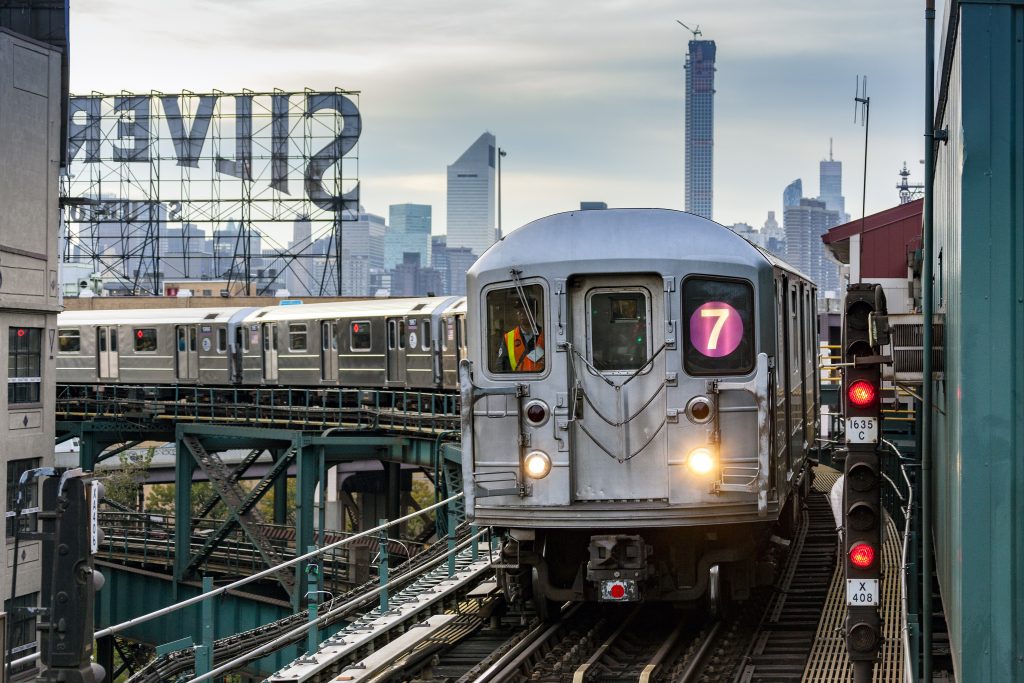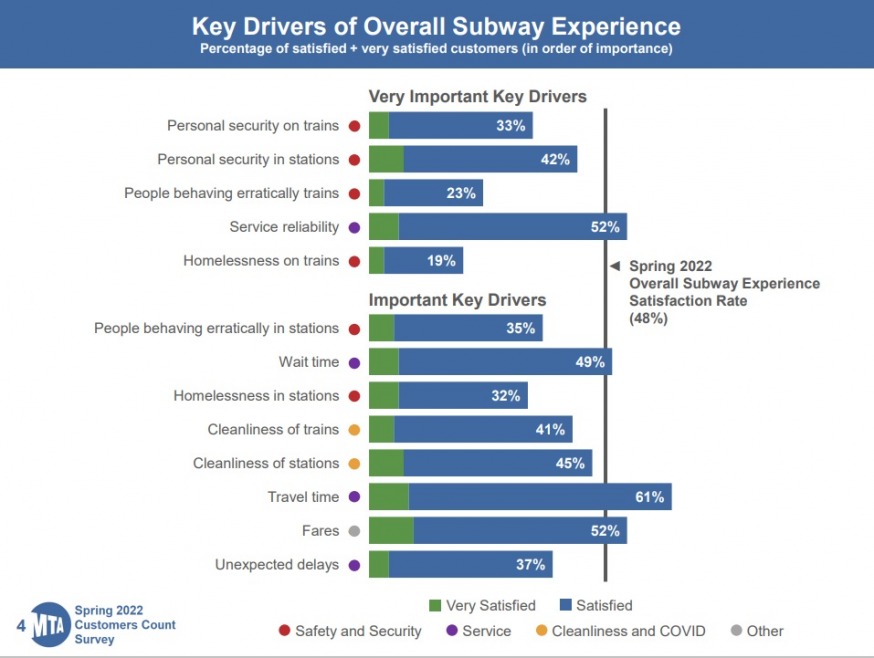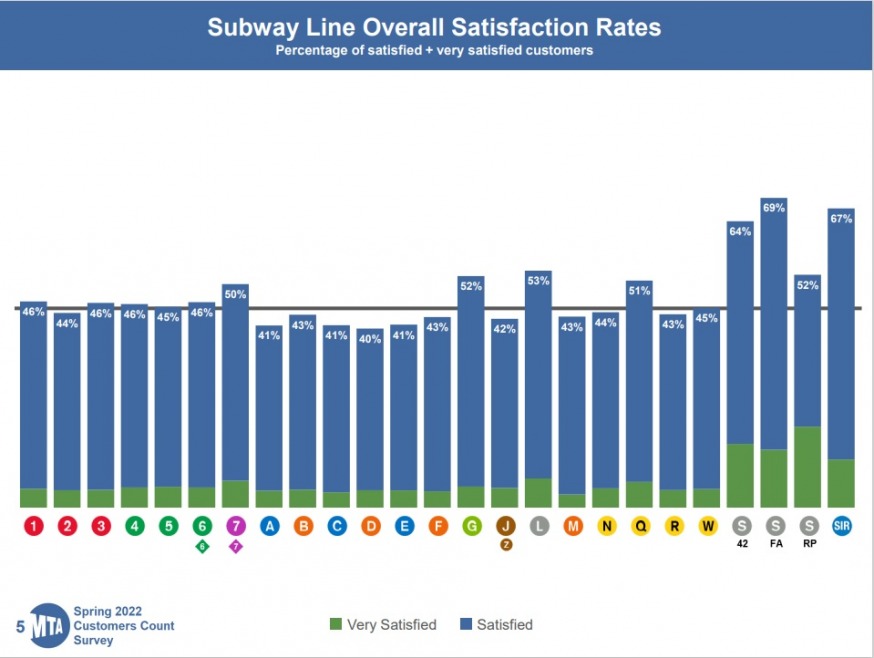
Fifty percent of subway riders said they were satisfied or very satisfied with 7 train service in a recent MTA survey. (iStock)
Sept. 20, 2022 By Christian Murray
The MTA released the results of it’s Spring 2022 bi-annual survey Monday that revealed that only 48 percent of subway riders are either satisfied or very satisfied with service.
The results were based on a survey where the MTA gathered feedback from riders who rely on New York City Transit, Metro-North Railroad and the Long Island Rail Road. The MTA received 268,000 responses, with 175,000 of the respondents being subway customers.
The survey, which was offered in eight languages, took place between June 14 and June 27 and was conducted online and via the phone.
Survey respondents ranked the 7, G, L and Q lines the highest in terms of customer satisfaction. Fifty percent were either satisfied or very satisfied with the 7-line service, with that number being 52 percent for the G train, 53 percent for the L train, and 51 percent for the Q train.
Most subway riders indicated that safety and security was extremely important. Only 33 percent, however, were satisfied or very satisfied with the level of personal security on the trains, with that number being 42 percent in terms of security at stations.
Service reliability was also deemed as important, with 52 percent of respondents reporting that they were satisfied or very satisfied.
“We take feedback seriously and want all our customers to feel confident that they will experience reliable and safe service every time they take subways and buses,” New York City Transit President Richard Davey said in a statement.
Customer satisfaction on the subway was low compared to the LIRR and Metro-North. The survey found that there was a satisfaction rate with both those rail systems of over 80 percent.
New Yorkers are letting us know what they like and what they feel needs work, and we appreciate their participation by taking the survey,” MTA Acting Chief Customer Officer Shanifah Rieara said in a statement. “We will do everything we can to make our customers feel most comfortable.”

The results of the MTA Spring 2022 survey based on the response of 268,000 MTA customers. Approximately 175,000 of the respondents were subway customers. (Screenshot of survey)

The results of the MTA Spring 2022 survey based on the response of 268,000 MTA customers. Approximately 175,000 of the respondents were subway customers. (Screenshot of survey)
4 Comments

Who did they poll? The bums, thieves, rapists, and alcoholics who use the transit system during off peak hours? If Law enforcement knows that its during overnight hours that crimes are being committed, then these are the times when there should be Police presence. Its not rocket science.
Many riders will continue not returning due to concerns about criminal activity, homelessness and vandalism. This needs to be dealt with if the MTA wants to see a return to pre-COVID 19 ridership of over five million daily customers. Police need to deal with more important issues than immigrant vendors selling Churro and other products underground. Return to the days when a transit police officer was assigned to ride each train and others patrolled stations. This, along with the promise of installation of security cameras on all trains and stations might help to reduce the perception of growing crime.
As more riders return, there will also be a potential increase of rats, mice and litter. Place more trash cans in stations. Install separate cans for recycling newspapers, plastic and glass, along with regular garbage. Selling advertising on the side of cans could generate revenue to help cover the costs of more frequent off-peak and late-night collection and disposals.
Conductors should refrain from closing the doors while riders attempt to cross the platform attempting transfers from a local to the express train.
Find better solutions to dealing with waiting for or riding the subway and having the “urge to go.” The odds of finding a working bathroom for “relief” may be too late. Increase the number of open fully-equipped bathrooms at more of the 471 subway stations. Working bathrooms are better than the current unpleasant alternatives, which contribute to dirty subways. Add to the number of stations in compliance with the Americans with Disabilities Act (ADA).
(Larry Penner — transportation advocate, historian and writer who previously worked for the Federal Transit Administration Region 2 NY Office. This included the development, review, approval and oversight for billions in capital projects and programs for the MTA, NYC Transit, Metro North Rail Road, MTA Bus along with 30 other transit agencies in NY & NJ)
.
While it is true that NPYD needs to crack down on crime, vandalism and vagrancy they should not turn a blind eye to these “immigrant [ie illegal alien] vendors selling Churro..” or fare jumpers etc.. There is something to be said about the Broken Windows theory.
Many riders will continue not returning due to concerns about criminal activity, homelessness and vandalism. This needs to be dealt with if the MTA wants to see a return to pre-COVID 19 ridership of over five million daily customers. Police need to deal with more important issues than immigrant vendors selling Churro and other products underground. Return to the days when a transit police officer was assigned to ride each train and others patrolled stations. This, along with the promise of installation of security cameras on all trains and stations might help to reduce the perception of growing crime.
As more riders return, there will also be a potential increase of rats, mice and litter. Place more trash cans in stations. Install separate cans for recycling newspapers, plastic and glass, along with regular garbage. Selling advertising on the side of cans could generate revenue to help cover the costs of more frequent off-peak and late-night collection and disposals.
Conductors should refrain from closing the doors while riders attempt to cross the platform attempting transfers from a local to the express train.
Find better solutions to dealing with waiting for or riding the subway and having the “urge to go.” The odds of finding a working bathroom for “relief” may be too late. Increase the number of open fully-equipped bathrooms at more of the 471 subway stations. Working bathrooms are better than the current unpleasant alternatives, which contribute to dirty subways. Add to the number of stations in compliance with the Americans with Disabilities Act (ADA).
(Larry Penner — transportation advocate, historian and writer who previously worked for the Federal Transit Administration Region 2 NY Office. This included the development, review, approval and oversight for billions in capital projects and programs for the MTA, NYC Transit, Metro North Rail Road, MTA Bus along with 30 other transit agencies in NY & NJ)